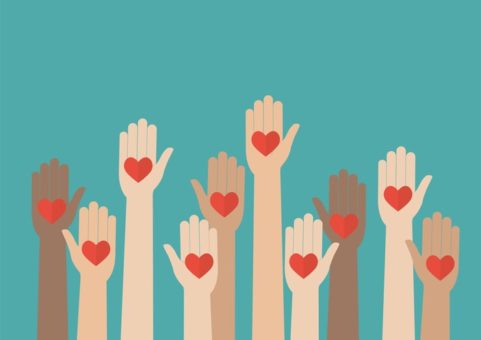Updated on 3/8/2023
Volunteering has many mental health benefits. Not only does it help others, but can also be a critical component to fighting our own anxiety and other mental health disorders. Taking time to connect with others over a shared goal of helping people, animals or the environment can make us feel rejuvenated and fulfilled. April is National Volunteering Month, a time to think about where you can help your community, and the ways it can benefit your health as well.
April is National Volunteering Month, a time to express gratitude and give thanks for our health, good fortune and the loved ones in our lives and extend our appreciation for others by volunteering our time or donating money or gifts to a charity. While we think of this as helping others, volunteering is also helpful for your personal mental health. Research has shown a correlation between volunteering and mental health benefits. Expressing gratitude through volunteering can benefit both you and your community.
Self-care through volunteering
Volunteering brings people closer together and creates community, which is a critical component of fighting anxiety, depression and other mental health disorders. As humans, even if we are introverts, we need to be connected to others. Volunteering in your community not only strengthens your community, but also can allow you to make new friends, expand your network and improve your social skills. Dedicating time to a project, or others, is a great way to increase your self-esteem and life satisfaction.
Social isolation is a critical component of depression. Spending time working on meaningful and exciting projects within your community can be a relaxing, energizing escape from your daily routine. Volunteering also provides you with renewed creativity, motivation and a vision that you can carry into your professional and personal life.
Community care as a different approach to self-care for mental health
Self-care often refers to taking time for yourself to unwind, relax and do things that rejuvenate your mind and body so that you can function as a happy, healthy individual. Self-care may mean taking a long nap, taking a day off of work, going on a short vacation, reading a book or taking up a new hobby, but this type of care does not necessarily contribute to others.
Community care is a branch of self-care that is a well-known social movement. Community care is defined as any care provided by a single individual to benefit other individuals in their life. Community care can be as simple as doing someone’s dishes or running someone’s errands when they are taking care of their kids during a tough time. It could also entail reaching out to friends who need to talk or organizing neighborhood watch groups, community support groups or neighborhood events. Sometimes self-care means helping others, and by lending a helping hand, you can feel rejuvenated and fulfilled.
Volunteering burnout
Expressing gratitude is an excellent way to care for others and care for ourselves, but what happens when we overextend ourselves? Volunteer burnout is similar to work burnout,. Whether you are giving countless hours to a local charity, volunteering at your child’s school or raising money for multiple organizations, sometimes giving too much can have a negative effect on your health.
As individuals, we naturally want to help others, especially those we care about. However, sometimes we overextend ourselves, leaving us feeling fatigued, unmotivated and even resentful. It is essential to maintain a healthy balance. You should be mindful of feeling obligated to give your time or money, and careful if you start to feel burned out from volunteering, especially when it can negatively affect your physical and mental health.
Volunteer ideas
If you are interested in giving back to your community, below are a few fun ideas that the whole family can enjoy:
- Volunteer at a soup kitchen
- Donate toys to a local homeless shelter, toy drive or children’s home
- Donate food items for a holiday dinner to a food drive
- Donate warm clothes to charities in need
- Volunteer with high school students and organizations to help them prep for their college applications
- Donate pet food, blankets and beds to your local animal shelter
Kristen Fuller, M.D., is a clinical content writer and enjoys writing about evidence-based topics in the cutting-edge world of mental health and addiction medicine. She is a family medicine physician and author, who also teaches and contributes to medicine board education. Her passion lies within educating the public on preventable diseases, including mental health disorders and the stigma associated with them. She is also an outdoor activist and spends most of her free time empowering other women to get outside into the backcountry.
More from Discovery Mood & Anxiety Program:
